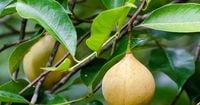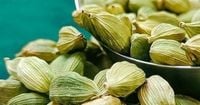Vietnam is making a name for itself on the global spice market with the cultivation of cardamom, a spice ranked as the third most expensive in the world, following saffron and vanilla. This valuable spice has garnered significant attention, particularly from major importers like the United States and the Netherlands, leading to a remarkable surge in exports.
As of April 18, 2025, Vietnam boasts over 500,000 hectares dedicated to spice cultivation, involving around 400 enterprises and hundreds of thousands of smallholder farmers. Among the diverse array of spices produced, cardamom stands out not only for its price but also for its nutritional and medicinal properties.
According to the Vietnam Pepper Association (VPA), Vietnam exported 760 tons of cardamom and nutmeg in the first quarter of 2025, generating a turnover of 6.7 million USD. This represents a staggering 39.2% increase in volume and a 37% increase in value compared to the same period last year. The Netherlands and the United States are the leading markets for these exports, with 240 tons and 125 tons respectively.
Cardamom, often referred to as the "queen of spices," thrives in Vietnam's high mountainous regions, particularly in provinces like Cao Bang and Lao Cai, where the climate is cool and conducive to its growth. The plant typically reaches heights of 2 to 3 meters and is perennial, producing fragrant white-purple flowers that cluster at the base of its leaves. Both the flowers and the fruits of cardamom are harvested for their medicinal benefits, but only from plants that are at least three years old.
Nutmeg, a close relative of cardamom, originates from the Maluku Islands of Indonesia and is widely cultivated in tropical regions, including Cambodia, India, and Malaysia. In Vietnam, nutmeg is primarily grown in the southern provinces and can be harvested after 7 to 8 years, with two harvests possible each year.
Health experts highlight the numerous health benefits of cardamom. According to Healthline, it contains potent antioxidants such as phenolic and terpenoid compounds, which help neutralize free radicals and reduce the oxidation of bad cholesterol (LDL). This action aids in preventing the formation of atherosclerotic plaques, thus lowering the risk of cardiovascular diseases such as strokes and heart attacks.
Moreover, cardamom is known to enhance digestion, alleviating issues such as bloating, nausea, and acid reflux. Its anti-inflammatory properties also make it beneficial for treating various ailments, including respiratory conditions and joint pain. Furthermore, cardamom is believed to support liver health by aiding in detoxification and cellular repair.
Not only does cardamom provide physical health benefits, but it is also considered a "mental therapy" due to its soothing aroma. The essential oil derived from cardamom is known to promote relaxation, reduce stress, and improve sleep quality. When combined with practices such as meditation, yoga, or massage, its calming effects are significantly enhanced.
Despite the promising outlook for Vietnam's spice industry, challenges remain. The sector faces issues such as climate change, international competition, and stringent quality requirements from importing countries. Currently, only 40-50% of Vietnam's spice production potential is being effectively utilized.
To address these challenges, the Vietnamese government is focusing on strategic planning for spice cultivation in key growing regions. Additionally, there is a push for enterprises to adopt modern technologies to enhance product quality and meet international standards.
Looking ahead, the total export turnover of Vietnamese spice products is projected to reach approximately 2 billion USD by 2025, with an estimated export volume of around 500,000 tons. As the demand for high-quality spices continues to rise globally, Vietnam's cardamom and nutmeg could very well become staples in kitchens around the world.
In conclusion, Vietnam's emergence as a key player in the global spice market is a testament to its unique agricultural capabilities and the growing recognition of its high-value products. With continued investment and support, the country is poised to further enhance its position in this lucrative industry.





